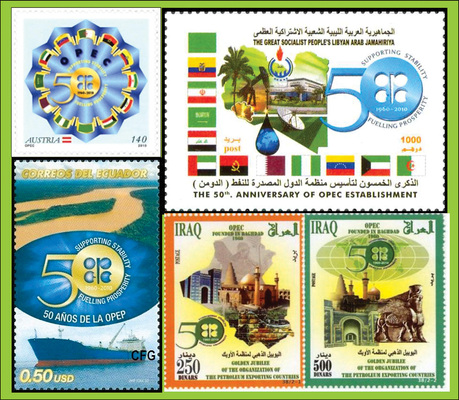
by Rasoul Sorkhabi Thursday, January 5, 2012

In 2010, Austria and OPEC members issued stamps to commemorate OPEC's 50th anniversary. Courtesy of OPEC
Last September, the Organization of the Petroleum Exporting Countries (OPEC) celebrated its 50th anniversary. Over the past five decades, OPEC has earned a reputation for being a powerful cartel that controls the world’s oil production and prices — but there are limits to OPEC’s influence and wealth. In fact, many OPEC countries face grave problems, which, to some extent, are the result of their oil-based economies. Looking ahead to the next 50 years, it is imperative that we have an analytical understanding of OPEC, its current position and the role it may (or may not) play in the coming decades
OPEC was founded in 1960 by Venezuela, Saudi Arabia, Iran, Iraq and Kuwait in response to oil price reductions enacted by international oil companies, which adversely affected the revenues of the oil-exporting governments. It formed, as one OPEC delegate once remarked, “as a cartel to counter a cartel.” The other cartel was the “Seven Sisters,” comprising Exxon, Mobil, Chevron, Texaco, Gulf Oil, Shell and BP, that, through various joint consortia, controlled the bulk of the oil reserves, production and trade in the non-Communist world.
Early on, the Seven Sisters ignored OPEC’s existence, but the companies began to take note of the new cartel in the 1970s, as the governments of OPEC countries gained control of their own natural resources and took over their petroleum industries by share purchases or nationalization. OPEC’s national oil companies and oil ministries still heavily rely on foreign oil and service companies through various contracts and consortia in areas of exploration, production, refinery, distribution and marketing. But for the most part, today the national companies have more of the world’s share of oil than the private companies.
Delegates from OPEC’s 12 member countries meet twice a year in Vienna, Austria, to make policy decisions. During these “conferences,” OPEC evaluates global oil issues, and to keep international oil prices stable, it allocates production quotas (barrels per day) to the member countries. These quotas vary depending on each government’s oil reserves and economic situation.
© 2008-2021. All rights reserved. Any copying, redistribution or retransmission of any of the contents of this service without the expressed written permission of the American Geosciences Institute is expressly prohibited. Click here for all copyright requests.